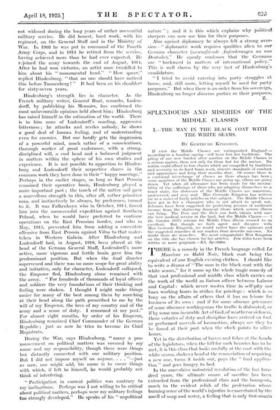SPLENDOURS AND MISERIES OF THE MIDDLE CLASSES
I.—THE MAN IN THE BLACK COAT WITH THE WHITE SEAMS.
BY GERTRUDE KINGSTON.
If ever the Middle Classes aro extinguished England— according to a familiar saying—will have lost her backbone. The piling of one new burden after another on the Middle Classes is a serious matter, then, not only for them but for the nation. No nation could afford to lose classes which are compelled by tradition and necessity to do hard brain work, observe standards of conduct and appearance and keep their mouths shut. Of course there is a continual interchange of classes as there always has been ; some members of the Middle Classes are going up, others are going down. Yet when all allowance has been made for the inevitability of the sufferings of those who are adapting themselves to a lower state, the distresses of the Middle Classes are numerous, undeserved, and very real. Miss Gertrude Kingston has written for us a series of lively articles on this subject. The Middle Classes have got in her a champion who is not afraid to speak out. Schemes have been suggested for protecting persons of moderate income from the shattering financial blows which serious illness can bring. The Poor and the Rich can both obtain with ease the best medical service in the land, but the Middle Classes— ! Dr. Gordon Dill's scheme for Middle Class illness seemed to us excellent. But though we both agree and disagree with Miss Gertrude Kingston, we would rather have the opinions and the suggested remedies of our readers than describe our own. No doubt there are remedies. We must congratulate Miss Kingston on the title she has chosen for her articles. Few titles have been wittier or more poignant.—Ed. Sinctator.
THERE is a comedy in the French language called Le 1Monsieur en Habit Noir, black coat being the equivalent of our English evening clothes. I should like to write a drama of "The man in the black coat with the white seams," for it sums up the whole tragic comedy of that vast professional and middle class which carries on the work of the world as liaison officer between Labour and Capital : which never wastes time in self-pity nor loses working hours in strikes for privilege : which is so busy on the affairs of others that it has no leisure for business of its own : and if for some obscure grievance of some obscurer working-man the traffic is dislocated, or if by some non-insurable Act of God, of weather or sickness, these votaries of duty and discipline have arrived on foot or performed marvels of locomotion, always are they to be found at their post when the clock points to office hours.
Yet in the distribution of loaves and fishes at the hands of the legislators, when the bill for such luxuries has to be met, it is this class that looks ruefully at the coat with the white seams, shakes a head at the renunciation of acquiring a new one, turns it inside out, pays the " final application" and goes hungry to bed.
In the convulsive industrial revolution of the last hundred years, the ultimate ounce of sacrifice has been extracted from the professional class and the bourgeois, much to the evident relish of the proletarian whose burning sense of the world's injustice is exacerbated by the smell of soap and water, a feeling that is only first-cousin to the class-consciousness of arrogance begotten in the Tory by his morning bath and clean linen, while the Whig ---,platonically neutral—allows himself to be wooed like a courtesan without a heart; impartially despoiling all and helping none.
Now during the recent inquiry on the cost of living, three honest and ingenuous housewives exposed with crystal clearness the whole disadvantage of belonging to the middle class of citizens. Two of these were indeed of the working class and had not intended to betray any but their own burdens. By inference only did they reveal the chasm that divides the strata that covers its shabby attire by well-brushed neatness from the social level where it is permissible to go shopping in " father's cap " and a shawl gathered round the shoulders. " Father " having acquired during the War, not a taste in caps but a taste in " steaks and joints," suffers only—so the housewife told us—at the hands of an inept cook who rules the destinies of the family, and (with a wisdom in which previous Boards of Education have been significantly wanting) the witness added this rider : " It was ignorance that kept people poor," by which she probably also meant " poorly nourished."
Presently enter on the scene the third Citizen's wife in the cast. To her investigator she replies : "It is very difficult for the Middle Classes to compare pre-War with present prices, because their standard of living has gone down." Again : " Yes. The average women of the Middle Class are good cooks ; the married on such small means that they must make themselves efficient in housework."
Her statement has the simplicity of Greek tragedy ; but the poignancy of it gets blurred in the grey tints of familiar suburban surroundings. If she can afford to keep a servant out of the housekeeping money, "mother's " duties are perhaps not so varied but are still arduous enough, for the general servant is not so much of a servant as a general, and gives her commands as to her own " leave "to her second-in-command, her mistress. Those ladies of high rank issuing their humanitarian ukases over the shoulders of their grooms of the chamber, and those peeresses of finance who pay their kitchen-maids the wages of a bank clerk, have not made things easier for gentility in West Kensington or Hampstead. As long as the " general " is on the active list, the daily campaign against the dirt of the coal-burning metropolis and high prices can still be waged. But if the general is stricken with the prevalent plague which curiously enough before the Health Insurance Act never seemed so frequent, then the trouble begins : that Act having been framed for prescribing pink tonics for pale people without any reference to epidemic catarrhs.
Every member of the House of Commons—where all were for the sentiment and none were for the sense—fell on his neighbour's neck in an emotional enthusiasm for the hastilydevised health insurance. Was it a scheme by which the hospitals, always begging, always pulling in their waist-belts hungry for want of support, were at last to be placed on a sound financial basis by weekly stamps forced Out of the employers' pockets ? Not a bit of it Were the outpatient wards to be enlarged and local doctors subsidized to attend in turn ? Nothing of the kind ! Was there to be a division of medical attendance whereby the overworked practitioner would distribute some part of the practice to which he could not do justice ? Hardly possible in a profession that is monopolist in its methods !
No! The man of small practice, whether by force of circumstance or attainment, became a panel doctor whose waiting-room is trammed to suffocation with a class of patient ignorant of the danger of infection, and who hardly has time to examine thoroughly the patient much less to sterilize the consulting-room.
Turn now to the effect of this panel system in the home of the middle class for which the politicians would have had us believe it was specially designed. For the splendour of keeping one or even two servants to leave him free to carry on his own vocation the employer contributes a weekly sum of fivepence each. If the servant is ill of influenza, how will it help him ? The panel doctor will Call, but no. hospital or infirmary will take in the case; A servant ill in bed must be nursed, and must also be replaced by a substitute. There are thus three to be paid for in lieu of one.
A professional woman of my acquaintance whilst daily engaged in earning her living had the unpleasant experience of having one maid dangerously ill with influenza while the other maid had an accident causing a. serious inflammation to the leg. The neighbouring hospitals would not admit the latter even at :their own terms, arguing that some of their wards were closed. As she considered that every moment was vital to the girl's chance of saving the limb, with influenza in the house there was no choice but to take her• to the Infirmary, where indeed she was magnificently nursed back to recovery ; but the maid never forgave her mistress for sending her to the "pauper's hospital," as she called it, anti bitterly resented her own weekly contribution for "that." And she has justice on her side. If she has an accident in the street she will straightway be carried to a hospital, but if she meets with it in the house of her employer, his liability under the law makes things less easy. For not only has the employer to contribute to the Health Insurance under the Act, but he has privately to insure himself against Employers' Liability, and while the servant is lying ill at his house the Insurance Society has first to be satisfied of the validity of the claim. Meanwhile the panel doctor may be deficient in surgical skill or his hand may have lost its cunning. In a large establishment the housekeeper would probably make short work of it all, for servants as a body are singularly devoid of pity to one another ; but in a small household the relation between employ-er and employee is a more feudal one.
Well, what provision is made by the State for the most faithful of its citizens, the householder of slender means ? None. For a premium varying according to age and constitution commercial enterprise will insure him against accident or illness, but I know of no hospital that will admit a householder who can keep a servant or two without considerably bigger fees than he can afford to pay. A private Nursing Home is still more prohibitive ; but, of course, if the great surgeon will not operate in the home and a patient values his life, his family may make the sacrifice.
And so while the miserable professional man is lying there ill with his pulse running the race for life, his convalescence is retarded by the terror of the liability of his bill of health that will be hanging over his head if he recovers. How often must he think to himself : " Verily it is easier and cheaper to slip quietly out of this and leave the world to Party and to Profiteers."











































 Previous page
Previous page